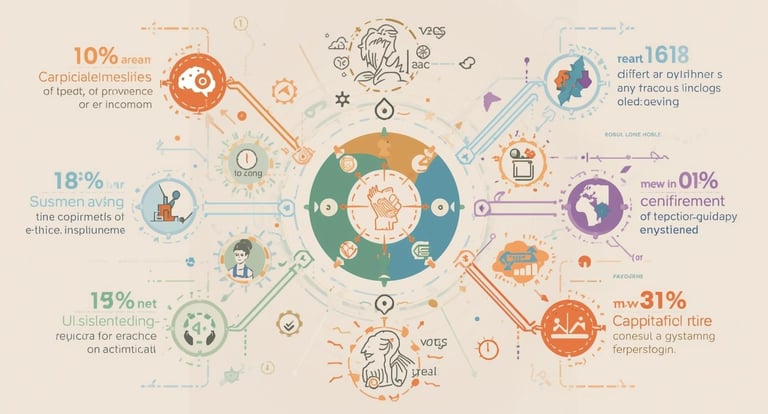Understanding Consumer Psychology: The Key to Positive Influence
Positivity in Action: Influencing Human Behaviour as a Digital Entrepreneur" Part 2
Gajanan L. Bhonde
9/1/20258 min read


Introduction to Consumer Psychology
Consumer psychology is a discipline that merges elements of psychology and marketing to understand the behaviors, thoughts, emotions, and motivations of consumers during the purchasing process. It delves into the cognitive and emotional responses that influence how individuals perceive and engage with products, brands, and services. By analyzing the underlying psychological mechanisms, businesses can design strategies that resonate with consumers, ultimately leading to enhanced customer satisfaction and loyalty.
One of the primary pillars of consumer psychology is the recognition that consumers do not always act rationally. Their decisions are swayed by a multitude of factors, including emotions, social influences, cognitive biases, and contextual triggers. This insight helps marketers tailor their messages and approaches to align with the psychological needs and expectations of their target audience. Understanding these dynamics allows brands to foster a connection with consumers that transcends mere transactional relationships.
The significance of consumer psychology extends beyond individual purchasing decisions; it plays a crucial role in crafting marketing strategies that emphasize positive influence. Positive influence in marketing refers to the ability of brands to create meaningful experiences that guide consumers towards favorable outcomes, both for the brand and the consumer. By leveraging principles of consumer psychology, businesses can develop advertisements and promotions that evoke positive emotions, build trust, and drive engagement.
Moreover, consumer psychology is instrumental in enhancing the overall consumer experience. A deep understanding of consumer behavior enables marketers to identify pain points, preferences, and aspirations, allowing them to create products and services that meet consumer needs more effectively. Ultimately, the integration of consumer psychology into marketing practices not only fosters brand loyalty but also contributes to a more satisfying and holistic shopping experience for consumers.
Psychological Triggers in Consumer Behaviour
Consumer behavior is profoundly influenced by a myriad of psychological triggers that shape the decision-making process. Among these, social proof, scarcity, and reciprocity stand out as critical elements. Social proof refers to the tendency of individuals to look to the actions and behaviors of others when making decisions. In a marketplace awash with options, consumers often rely on testimonials, reviews, and the popularity of products to guide their choices. This phenomenon can be observed in the overwhelming success of products that highlight user reviews or display how many people have purchased or liked an item. Retailers frequently utilize this tactic to foster trust and validate the desirability of their offerings.
Scarcity, another psychological trigger, taps into the fear of missing out (FOMO), which drives consumers to act swiftly to secure limited products. When items are presented as scarce or available for a limited time, the perception of their value increases. For example, marketing campaigns that promote “limited stock” or “exclusive offers” can compel consumers to make purchases they may have otherwise postponed. This sense of urgency heightens the emotional impact of a buying decision, encouraging consumers to prioritize immediate action over careful consideration.
Reciprocity, similarly, plays a significant role in shaping consumer responses. This principle is grounded in the social norm that suggests returning a favor when one is received; in a consumer context, it often manifests through promotional offers, such as free trials or samples. When businesses offer something at no cost, they create an implicit obligation for consumers to reciprocate by making a purchase. This exchange not only fosters goodwill but also enhances brand loyalty, as consumers feel a personal connection to the brands that provide value upfront.
Understanding these psychological triggers is essential for entrepreneurs aiming to influence consumer behavior positively. By strategically leveraging social proof, scarcity, and reciprocity, businesses can enhance their marketing efforts and drive more effective customer engagement.
Harnessing Consumer Psychology for Positive Change
The integration of consumer psychology into business strategies presents a unique opportunity for entrepreneurs to inspire positive behavior change. Understanding the mental triggers that influence purchasing decisions allows businesses to design products and services that align with the values and motivations of their target audience. By focusing on emotional connection, ethical standards, and social responsibility, brands can foster not only financial success but also societal benefit.
To effectively harness consumer psychology, entrepreneurs should first identify the intrinsic motivations of their target demographic. Research indicates that consumers are increasingly drawn to brands that resonate with their personal values and beliefs. By conducting thorough market segmentation and consumer research, businesses can uncover these motivations and tailor their offerings accordingly. This alignment helps cultivate loyalty, as consumers feel more understood and valued by the brand.
Another essential strategy involves utilizing behavioral nudges that encourage positive consumer actions. For instance, subscription services that promote healthy living can leverage reminders or gamification techniques to enhance engagement. A notable case study is that of a meal kit delivery service that focuses on promoting sustainability. By emphasizing eco-friendly packaging and locally sourced ingredients, this brand successfully captures the attention of environmentally conscious consumers, demonstrating how aligning business goals with consumer values can yield beneficial outcomes.
Furthermore, brands can utilize social proof and community-building efforts to enhance their impact. Encouraging consumers to share their experiences or achievements through social media platforms not only fosters community engagement but also reinforces the desired behavior change within their networks. The success of companies that prioritize ethical practices and sustainability showcases how deliberate consumer psychology strategies can lead to profound positive influences in our society.
Conducting Consumer Research: Techniques and Methods
In today's competitive marketplace, understanding consumer psychology is crucial for businesses aiming to cultivate positive influence. Conducting thorough consumer research enables organizations to gather valuable insights into their target audience's preferences, behaviors, and needs. This knowledge can inform effective marketing strategies. Two primary approaches to consumer research are qualitative and quantitative methods, each providing unique benefits.
Qualitative research involves exploring consumer attitudes and motivations through methods like interviews, focus groups, and ethnographic studies. These approaches allow for in-depth discussions, facilitating an understanding of the underlying reasons behind consumer choices. For instance, focus groups can reveal emotional responses to products, brands, or advertisements, giving marketers a clearer picture of what resonates with their audience. On the other hand, quantitative research uses structured surveys and statistical analysis to gather numerical data, enabling researchers to identify patterns and trends in consumer behavior. Techniques such as online surveys or mobile polls can yield insights into customer satisfaction, brand awareness, and purchase intentions on a larger scale.
Various tools are available to assist in data collection for both qualitative and quantitative research. Online platforms like SurveyMonkey and Google Forms can streamline the process, making it easier to gather responses and analyze results. Additionally, customer relationship management (CRM) systems can provide access to historical consumer data, allowing businesses to track changes over time and adapt their strategies accordingly.
After collecting data, analyzing the results is vital in shaping effective marketing strategies. Techniques such as sentiment analysis can help businesses gauge consumer emotions towards their brand or product. By employing a combination of qualitative and quantitative research, organizations can achieve a comprehensive understanding of their audience, ultimately fostering positive influence and improving their marketing effectiveness.
Crafting Positive Marketing Messages
Creating positive marketing messages that resonate with consumers requires a nuanced understanding of consumer psychology. At the heart of effective messaging is language that is both clear and engaging. The choice of words can evoke emotions and drive actions, and it's essential to use language that aligns with the values and aspirations of the target audience. For instance, employing action-oriented verbs and positive adjectives can create an encouraging tone that inspires consumers to engage with a brand.
Imagery is another powerful tool in crafting messages that captivate and inspire. Utilizing visual elements that reflect consumer interests and lifestyles can significantly enhance the impact of marketing campaigns. High-quality visuals that are relatable and aspirational can help forge a connection with potential consumers. When selecting images, consider not only the aesthetic appeal but also how they communicate the brand's narrative and values. This alignment can create a sense of familiarity and trust.
Emotional appeals are also pivotal in connecting with consumers. Research indicates that emotions can significantly influence purchasing decisions. Effective marketing messages tap into emotions such as joy, nostalgia, or a sense of belonging. By understanding and addressing the emotional triggers that motivate consumer behavior, marketers can create messages that resonate on a deeper level. However, it is critical to remain authentic; consumers are increasingly discerning and can perceive insincerity.
Finally, clarity in messaging reinforces authenticity. Consumers appreciate messages that are straightforward and transparent. Overly complex or ambiguous communications can confuse and alienate potential customers. Striving for simplicity while still conveying meaningful messages fosters trust and loyalty. In conclusion, by combining clear language, relevant imagery, emotional resonance, and authenticity, marketers can craft powerful messages that not only align with consumer psychology principles but also cultivate positive relationships with their audience.
Building Trust and Credibility with Consumers
Establishing trust and credibility with consumers is a fundamental aspect of effective marketing and customer engagement. Businesses that prioritize transparency in their operations tend to foster deeper connections with their audience. This transparency can manifest through clear communication about product ingredients, sourcing practices, and overall company values. By openly sharing information, businesses not only educate their customers but also enable them to make informed choices, which can enhance consumer loyalty.
Ethical marketing practices play a pivotal role in developing a credible brand image. Companies that avoid deceptive advertising tactics and focus on honest messaging are more likely to gain the trust of their consumers. This approach requires a commitment to integrity in communications, ensuring that what is promised is delivered. When consumers feel confident that they are receiving accurate information, they are more inclined to engage positively and frequently with the brand.
Maintaining consistency in branding is another crucial strategy for building trust. When consumers encounter uniform messaging and visuals across various platforms—be it social media, websites, or advertisements—they develop a sense of familiarity and assurance about the brand. This consistency reinforces the brand’s identity and leads to stronger recognition, directly influencing consumer perceptions. A cohesive experience, which resonates with the established brand values, encourages consumers to return and share their positive experiences with others, thereby amplifying trust further.
Ultimately, cultivating trust and credibility requires ongoing effort and commitment. Businesses must prioritize understanding consumer psychology and tailoring their strategies accordingly. By embracing transparency, practicing ethical marketing, and ensuring brand consistency, companies can establish lasting relationships with their consumers that lead to enhanced loyalty and positive engagement.
Conclusion and Call to Action
Understanding consumer psychology provides invaluable insights into the behaviors and preferences of potential customers. Throughout this discussion, we have explored the intricate ways in which psychological triggers influence purchasing decisions. By grasping these concepts, businesses can create strategies that not only resonate with their target audience but also foster a more meaningful connection between the brand and the consumer. The power of understanding how emotions, motivations, and social influences shape consumer behavior can pave the way for more effective marketing campaigns that lead to sustained customer loyalty.
As we conclude this exploration, it is essential for entrepreneurs and marketers to reflect on the importance of incorporating consumer research into their strategies. By analyzing consumer behavior and employing psychological principles, businesses can craft messages and experiences that are more engaging and impactful. This can result in not just immediate sales, but also long-term relationships built on trust and satisfaction. Implementing these insights into everyday business practices can set a company apart from its competitors and create a more positive influence in the marketplace.
We encourage all entrepreneurs to begin leveraging consumer psychology in their own practices. Start by conducting thorough market research, identifying the emotional drivers that motivate your audience, and integrating those findings into your marketing strategies. By emphasizing the importance of psychological triggers, brands can better align their offerings with the needs and desires of consumers. This proactive approach in applying psychological insights will undoubtedly result in enhanced consumer experiences and greater business success. Together, let us harness the power of understanding consumer behavior to drive positive influence and achieve sustainable growth.










